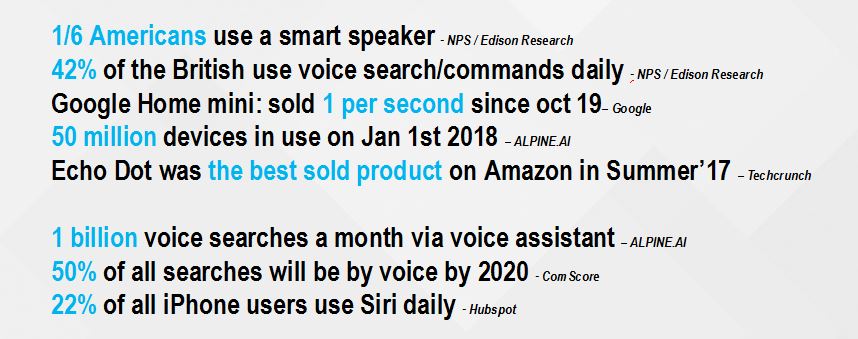The Voice Search Revolution – Position 0 is the new “page 1”
Reading time: 6 minutesLast week, the second edition of the Congress of Digital Communication was held. A lot of attention was paid to social media, and hardly no attention was given to voice search on these progressive events. That was not entirely unexpected for me because this is at every congress, every communication conference and every marketing fair in Europe where I have been. Voice search is still an underexposed topic in the dynamic, fast-paced world of online marketing.
This is actually quite unjustified:
* because the use of smartphones, tablets and digital watches has never been as high as it is now.
* because there are more and more applications in which voice plays an important role.
* because a new generation arrives that does more with voice and chooses for convenience (we are spoiled in the high-tech possibilities to make life easier, because talking (which goes well with multitasking) is preferred by typing).
* Simply because voice explodes. I see that users go beyond the keyboard and touchscreens. More and more people (in 2017 this was 20% of all searches) are asking their digital assistants what the weather is like in London, where you can get the best deal for a bright summer dress or where the nearest pizza place is located. By 2020, it is expected that more than 50% of all search results will be voice-based.
Even if speech does not completely replace the text in the future, this trend is already too big to be ignored. That is why my colleague Mike Jansen gives attention to this topic at Congress of Digital Communications. Because one thing is certain, voice search is going to change the game of search engine marketing.
Google Home: “Can you give me some statistics about Voice Search?”

Google Home: “Where do we start with optimise voice for SEO?”
- Local is key.
- Reviews are becoming more important.
What is the best airfryer?
Where can I get the best sushi?
In order to give a good answer to this question, we look at the quality but equally important is the quantity of the reviews.
- Implement featured snippets.
1) You have to process the questions of the visitors in the text (there are tools to find out which questions can be interesting).
2) You must have a detailed answer to this question and
3) the structure must be in order.
This is a really good start, but no guarantee to get a position 0. We are of course dealing with 2 unpredictable players: Google and your competition.

- Use full sentences.
What (is the advantage of an e-bike)?
(Search query: e-bike advantage)
Why (would I buy an e-bike)?
(Search: why e-bike)
Where (can I buy an e-bike in Breda)?
(Search query: e-bike breda)
* The texts must also be optimized for these demanding sentences and not just for a number of keywords. Sentences that people use when they speak, and not when they formulate a sentence in writing. To integrate the questions, a FAQ (Frequenty Asked Questins) is a very good start. Such a FAQ has the same detailed and complete structure as the voice searches. This will make you a lot more relevant for these voice commands.

- Go testing!
- Increase website popularity.
One thing that doesn’t change, is the importance of having a website with authority. With voice, only 1 answer is returning and from all websites on the world wide web websites with authority that frequently occupy high positions in the search engines are preferred.
Google Home: “Who can help me with the first steps to prepare me for the future of search?”
It’s new, it’s still unfamiliar, so it’s understandable that it’s still exploring. But now is the time to integrate voice search into your marketing strategy, as the competition in this is still pretty low. Do you want to prepare better for the future of search? We can help you with this. Stay tuned, subscribe to our newsletter for the latest developments. We are always on the lookout for new and smarter ways to integrate voice search optimally into your marketing strategy.